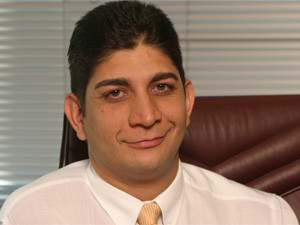
The mobile price war that started last year has taken another direction, with SA's first operator firing back with the introduction of a new offering for the country's vast prepaid customer base.
Vodacom's new prepaid product suite, Free4Sho, kicked off yesterday and offers customers a rate of R1.20 per minute (on a per-minute basis) to all networks - while calls made to Vodacom customers are charged at the same rate for the first three minutes, after which the rest of the hour is free.
Vodacom CEO Shameel Joosub notes the new prepaid price plan, called Vodacom Daily Free Calls, is "simple and easy to use". Customers will pay as little as 6c per minute, he says, as part of the price plan, introduced for customers who make longer calls.
Undercutting rivals
Vodacom's latest salvo in the war to maintain and win over South African customers comes about a week after smaller competitor Cell C launched its Supacharge product. The high-end offering for prepaid and hybrid customers gives prepaid and contract TopUp subscribers unlimited Cell C to Cell C anytime voice calls, when recharging with R500 or more.
World Wide Worx MD Arthur Goldstuck says there are two perspectives on Vodacom's aggressive new offering. "The first is that it is designed to undercut Cell C to a point where it is impossible to compete. If the pricing had included calls to other networks, that would certainly have been the case. However, it is only for on-net calls and this tells us that, since there is little incremental cost to Vodacom customers making on-net calls, it is possible for Vodacom to leverage its large customer base by providing the semblance of dramatically cheaper calls."
Goldstuck says, especially for families where all members are on the same network, it is an "astonishingly attractive" offer.
The second perspective, he says, is that, in the context of the attractive pricing from Cell C, it is a powerful incentive to Vodacom customers to stay with the network. While Cell C is offering better across-the-board pricing, by staying with Vodacom, customers get the benefit of both cheaper on-net calls and holding onto their numbers.
New era
Goldstuck says SA is in the midst of a "new era" in mobile telecoms. This, he says, began around the middle of last year, when it became clear for the first time across networks that voice revenue had flattened, while data revenue was exploding. "The pricing strategies we are seeing in 2013 began evolving during 2012."
Dubbed by industry observers as "the mobile price war", the new wave of mobile telecoms offerings started soon after former Vodacom CEO Alan Knott-Craig re-entered the cellular telecommunications arena - this time as CEO of third operator Cell C - in April last year.
About a month after having taken the reins, Knott-Craig introduced the market to the operator's now trademark "99 Cents For Real" price plan. The first of a barrage of deals to follow - a prepaid voice product that saw prepaid call rates dropping by more than 34% - immediately drew a reaction from rival Vodacom, setting the wheels of war in motion.
Goldstuck says Vodacom's new product is, in itself, aggressive. "However, pricing of a variable nature must always be seen in the context of the user's calling behaviour. One person's call patterns may be of such a nature that cheaper on-net calls make little difference to the overall cost, whereas the next person may find costs falling by half or more."
In short, he says, the aggressiveness of the product is a factor of its impact on individual users.
Telecoms outlook
Goldstuck says the telecoms landscape in SA, underpinned by the mobile duopoly of Vodacom and MTN, is beginning to morph.
"If there is a merger or takeover involving Cell C or 8ta, we could see the emergence of a third big player. On the other hand, Cell C is already emerging as a formidable competitor."
He notes that, while growth in customer numbers has flattened at the two major networks, it continues to rise steeply at Cell C and 8ta. "This suggests that the two small networks are claiming any of the growth that the big guys may previously have enjoyed."
Ultimately though, Goldstuck says the big question is how profitable these new customers are - and whether it does leave the bigger networks in a healthier situation as they shed low-revenue customers.
Share